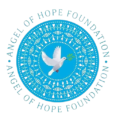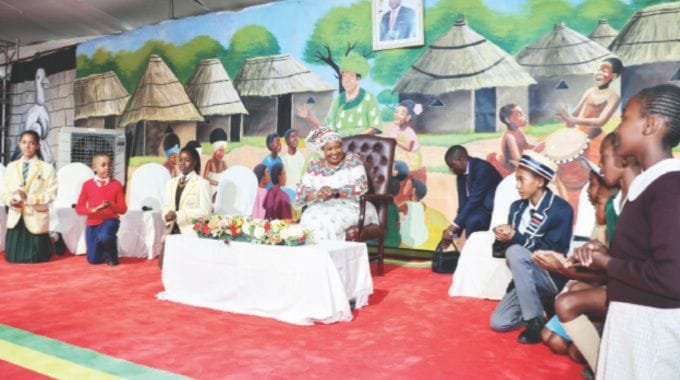First Lady unveils cultural quiz programme
Tendai Rupapa
First Lady Dr Auxillia Mnangagwa, who is the Patron of Culture and Heritage in the Ministry of Primary and Secondary Education, yesterday launched a first-of-its-kind and educative Zviperengo Cultural Quiz Programme for learners, providing a platform where local languages will be showcased on a national level thereby, protecting and preserving the country’s culture and heritage.
They were asked questions from proverbs to idioms, spellings, figures of speech, and riddles as well as translating English words to Shona.
The children will also compete in a culinary showcase where they will prepare foods unique to their ethnicities.
The historic launch of the programme, held at the Heritage Village in Harare, targeting Grades 5 to 7, which will be taken to all the country’s 10 provinces, comes at a time when most people had abandoned their mother languages and viewed them as inferior due to the effects of Westernisation.
Some parents and guardians mistakenly thought that having children speaking mostly in English was a sign of affluence, yet doing so alienated children from their heritage, cultural norms and values.
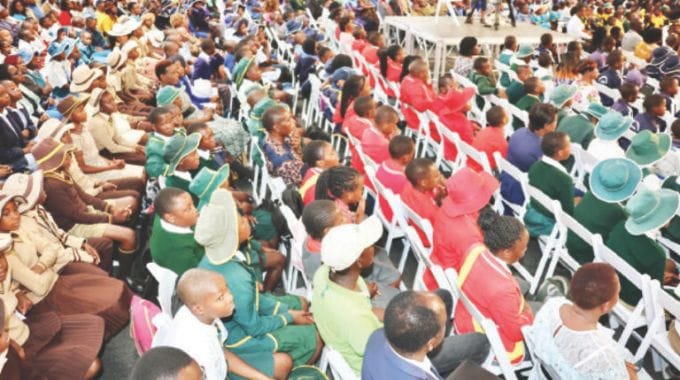
The educative and well-subscribed programme included learners from affluent to high-density suburbs as the First Lady is not leaving anyone and any place behind.
It emerged at the launch of the programme that some parents and children did not know various traditional instruments, utensils, and figures of speech, reinforcing the importance of the First Lady’s programme.
Amai Mnangagwa, who has children at heart, has been on a nationwide campaign where she has been instilling good values and morals in today’s youth.
In her address, Dr Mnangagwa said Zimbabwe was home to many languages, each carrying its own unique history, stories and wisdom.
The languages, she said, included Shona, Nambiya, Ndebele, Tonga, Venda, Shangani, and Xhosa just to mention but a few.
“These languages are the lifeblood of our culture. They are the threads that weave together, the fabric of our identity. I am pleased to announce that these competitions will be held in the depths prevalent in the regions of Zimbabwe depending on when the programme would be hosted. As I said, we shall go to all the 10 provinces and Harare you have been the first.
“Our children are also going to compete in a culinary showcase where they will prepare foods unique to their ethnicities. We shall cook and to those who have never cooked at home, you will prepare meals. This is a first-of-its-kind programme where our local languages are going to be showcased and examined on a national level. It is our duty as cultural custodians to ensure that these languages and the rich heritage they represent are not lost to time. We must pass them down to our children so that they may carry them forward with pride and honour,” she said.
Programmes like Zviperengo, said Dr Mnangagwa, could help ignite a passion for learning and preserving the country’s cultural heritage in learners’ hearts.
“In Zimbabwe we believe in the spirit of ubuntu. “I am because we are” this philosophy teaches us that our humanity is interconnected and that we thrive as a community when we support and uplift one another. The Zviperengo cultural quiz Programme embodies the spirit of ubuntu. It brings us together, fostering a sense of unity and belonging and reminding us that we are all part of a greater whole. As you participate in this programme, I encourage you to embrace the opportunity to learn about your heritage, celebrate the diversity of our nation, and take pride in your identity. Remember that you are the future of Zimbabwe and it is through your efforts that our culture will continue to flourish,” she said.
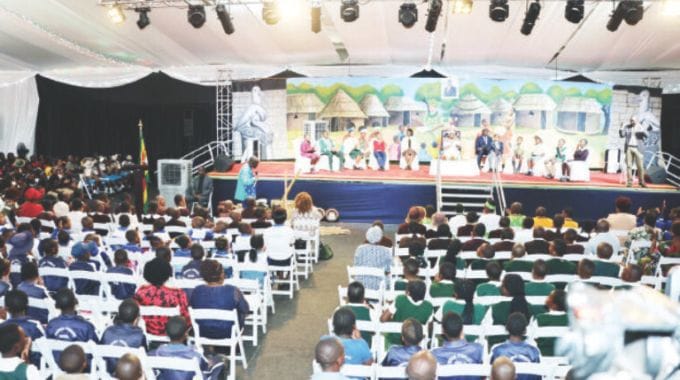
The First Lady enjoined people to work together to preserve languages, honour traditions, and build a brighter future for the country.
“Thank you and may the spirit of ubuntu guide us all. I thank my children that today you have come to a new teacher. You have come with your teachers, but today I am your teacher. I love you, my children, you are the pride of our nation, you are the pride of our dignity, you are the pride whom we shall bequeath to the knowledge that we have. You are the pride that will carry our nation forward. Therefore, never look down upon yourselves.
“You are important to my child. There is a lot that we expect from you. Through learning and being taught and through your character, the way you behave, not being involved in drugs, listening to parents, knowing who you are. You are a boy and what do you want to do? you are a girl and what would you want to be? You were not born to be a girl for the boys, you boys were not born to be a boy for the girls,” she said.
Dr Mnangagwa said she sought to come up with a model boy and girl who would be the envy of the nation and the world at large.
“Today we want to mould you so that wherever you go, you will not forget this day. Wherever you go, we shall not be present as your parents and teachers so preserve the teachings you shall receive today. These are the teachings that will look after you even when you go to school outside the country. Going to learn abroad is a result of excelling, you do not just go. Firstly, you must study hard. If you are lucky to go abroad, you must know that you come from Zimbabwe and you must behave as a Zimbabwean. Nowadays my children, westernisation is there, all of us, I think you heard me speaking here, English is for seeking jobs wherever you would have gone. We are, however, leaving our language and latching on to English. But English did not tell us how we live. Even at home we had taken it too far,” she said.
The mother of the nation said it was critical to support children in their quest to deepen their understanding of mother languages.
“Parents and teachers here present, we hear at some schools you do not encourage the use of the mother tongue. Even if you go to a school headed by those who are good in English, you must learn and pass while at the same time you will be speaking your mother tongue like Shona and Ndebele. With all the dialects that we have in our nation. We want you to preserve our languages,” she said.
Dr Mnangagwa gave a brief on how she started the programme.
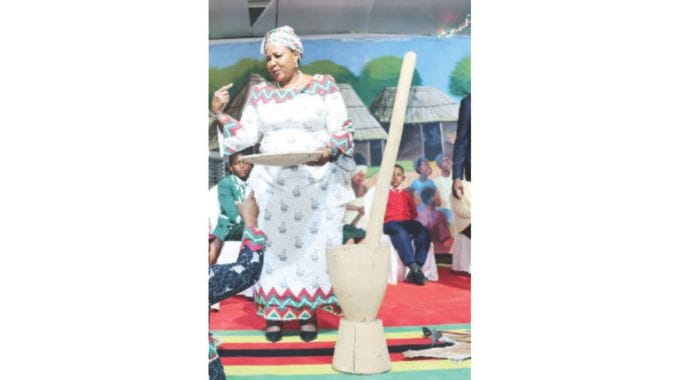
“In my Gota/Nhanga/ Ixhiba programmes I am meeting children showing that indeed they do not understand our culture like what you are supposed to do when you meet an elderly person. In my travels, I am noticing that you view the use of English as the uppermost thing and you then use English at the expense of your mother tongue. As an example, if a child goes to the village where the grandmother resides, the child will be using English yet the grandmother won’t be understanding the language. If the children get into the kitchen hut, they will be sobbing because of smoke showing that you are a child who does not frequently visit the village. This has prompted me to bring you all together and hold competitions in Shona with a view to bringing back the use of our mother tongue and encouraging the use of all languages. Despite this, we have started with Shona because this is the most spoken language here in Harare province. This dovetails with the aim of the Ministry of Primary and Secondary Education to mould children in line with the fortress of wisdom they refer to as the Heritage-based curriculum. The Ministry of Education aims that when children get into school, they must know where they came from, and understand the environment so that it sustains them as they make things from it. Do you know that our nation has a lot of wealth in the form of trees, rivers, animals, and minerals which you can use to make things that sustain you? Therefore, the Ministry of Education expects you to learn skills that will help you. This programme must mould you into a dignified person. These competitions are in three phases. The first phase is spellings where you are expected to spell words and be able to use them in sentences. The second phase encompasses zvirunga mutauro. You will be expected to share proverbs that are similar or different and explain their meanings. The last phase is nyaudzosingwi where you must explain these nyaudzosingwi and use them to complete sentences and use them in words. We shall also have idioms and similarities.
The First Lady asked what one says when they reach someone’s homestead and one of the learners said: “Tisvikewo.”
Another girl said “Gogogoi”.
A boy left the crowd in stitches when he said: “Unoti pachipamwe”.
Amai corrected him.
“What does pachipamwe mean,” the First Lady asked and a Grade 5 girl said it means “maswera sei?”
A Grade 6 boy said “pachipamwe” is used to someone you would have seen before, prompting the First Lady to clap hands for him.
She sought to know what a room for girls is called and the children all shouted “Nhanga”.
“What about the one for boys?” she asked and they all shouted “Gota”.
Dr Mnangagwa sought to know the place where ash is discarded.
A learner correctly said “Durunhuru” which was correct.
“What about mukadzi akafirwa nemurume?” and the answer was shirikadzi.
On traditional utensils, Dr Mnangagwa asked about the three utensils used for cooking sadza and the learners said musika, mugoti, and poto.
The First Lady said the answer was partly correct but the word poto from pot was not Shona and the correct utensil was tsambakodzi.
The mother of the nation asked the learners to name tools that
To Page 4
First Lady unveils first-of-its-kind cultural quiz programme
From Page 2
are used in cutting firewood and they all said an axe.
“But my children, as Environment ambassador I do not want to see an axe close to trees, why is this so?” the children said because such acts destroy the forests, depriving citizens of fruits and oxygen.
She also sought to know how nhopi is prepared.
A Grade 5 learner said with potatoes, while another pointed at butternuts and another contributor pointed at pumpkins.
A young girl left people in stitches when she said matemba were the young ones of fish.
She was, however, corrected by a fellow learner who said the young one of a fish was known as rereza in Shona.
The young one of a chameleon is called Mandishaya, they learnt.
Dr Mnangagwa expressed gratitude for the children’s competency.
“My children you are doing well, but how do you then fail to apply this in your tests? What is the young one of a mouse,” she asked.
In response, the children said Chiduwa.
A learner said it was called a baby rat but the First Lady weighed in saying the young one of a mouse is called Manditeya.
She also sought to know the young one of a zebra and the girl correctly said Njenjeta, though she failed to spell it.
Amai went on to ask spellings like nzvenzvana and hozhwa.
The First Lady asked the children more questions like Akubaira zani anenge akuita sei . . . akuyambira. Kufira mafufu segonzo kuita sei?
The learners said it means walking aimlessly, dying for useless things while the other said committing time to no avail.
Dr Mnangagwa also asked what the phrase “Kumirira nemeso matsvuku” means and the children said it means anger, but she said it means waiting in great anticipation.
Dr Mnangagwa had traditional foods and fruits and asked the children what these were and how they were prepared and or eaten.
There was food such as madora, dried vegetables, sorghum meal, traditional rice, round nuts, groundnuts, matemba, and multi-grain meal.
She also showcased a grinding stone, basket, winnowing basket, and different types of clay pots, wooden plates, drinking gourds, and reed mats.
A young girl drew laughter when the First Lady showed a dengu and asked why it was and one girl said it was a basket.
When an edge tool used in carpentry, mbezo, was lifted, some learners mistakenly referred to it as a hoe, while others said it was an axe.
Amai corrected them.
She also brought traditional musical instruments like rattles, mbira and marimba.
The First Lady turned to parents and asked them cultural quiz whereupon some failed showing that even some parents lack knowledge of traditional goods.
Back to students, the First Lady asked where a dog lived and some said in the danga while someone said in the house. These answers were, however, wrong.
A teacher corrected the learners and said inogara mugudzururu.
Another teacher said a kennel in Shona is called Usamo.
Amai then opened the floor for students to ask each other questions.
They asked from proverbs to idioms, figures of speech, and riddles as well as translating English words to Shona.
Deputy Minister of Primary and Secondary Education Hon Angeline Gata thanked the First Lady for sharpening the children’s brains.
“The programme that you unveiled today showed a gap that exists. You have opened the children’s brains. It also requires the effort of parents back home to strengthen what children have learnt here. You have moulded our children today Amai. This programme encourages children to have good manners and they shall excel in their studies because you have given them a deep lesson. Your vision carries the nation forward. This programme promotes our heritage like who we are. As the Ministry of Primary and Secondary Education, we thank you Amai,” she said.
Tourism and Hospitality Industry Minister Barbara Rwodzi praised the First Lady for her educative and quality programmes.
“The First Lady is the one who unveiled the Gota/Nhanga/Ixhiba Programme so that we return to our culture. Even some of us grown people were lost, but the First Lady taught us how to dress, and the food which nourishes us. boys and girls you are being taught so that you may be dignified people in the future. Amai is also the Tourism patron and for gastronomy tourism to be talked about in Africa, it’s all because of her. She is now the champion of gastronomy tourism in Africa. We want to thank Amai for launching this new programme and including competitions in culinary as part of the programme,” she said. – Herald
